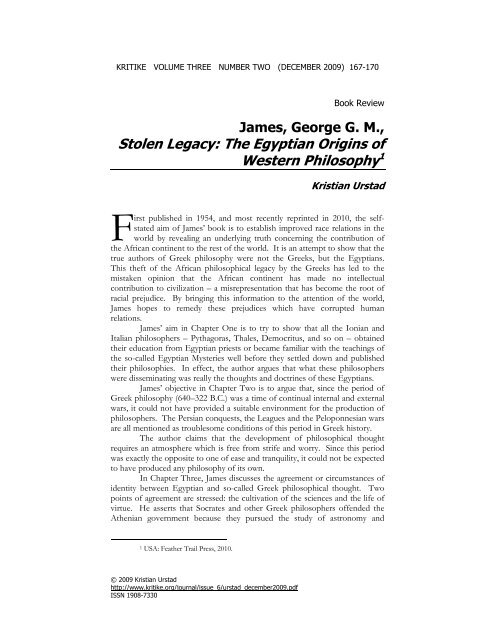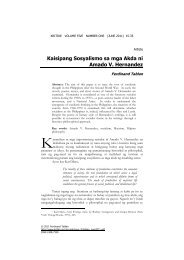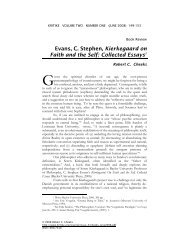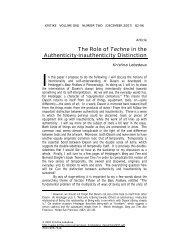James, George GM, Stolen Legacy - KRITIKE: An Online Journal of ...
James, George GM, Stolen Legacy - KRITIKE: An Online Journal of ...
James, George GM, Stolen Legacy - KRITIKE: An Online Journal of ...
Create successful ePaper yourself
Turn your PDF publications into a flip-book with our unique Google optimized e-Paper software.
<strong>KRITIKE</strong> VOLUME THREE NUMBER TWO (DECEMBER 2009) 167-170<br />
Book Review<br />
<strong>James</strong>, <strong>George</strong> G. M.,<br />
<strong>Stolen</strong> <strong>Legacy</strong>: The Egyptian Origins <strong>of</strong><br />
Western Philosophy 1<br />
Kristian Urstad<br />
F<br />
irst published in 1954, and most recently reprinted in 2010, the selfstated<br />
aim <strong>of</strong> <strong>James</strong>’ book is to establish improved race relations in the<br />
world by revealing an underlying truth concerning the contribution <strong>of</strong><br />
the African continent to the rest <strong>of</strong> the world. It is an attempt to show that the<br />
true authors <strong>of</strong> Greek philosophy were not the Greeks, but the Egyptians.<br />
This theft <strong>of</strong> the African philosophical legacy by the Greeks has led to the<br />
mistaken opinion that the African continent has made no intellectual<br />
contribution to civilization – a misrepresentation that has become the root <strong>of</strong><br />
racial prejudice. By bringing this information to the attention <strong>of</strong> the world,<br />
<strong>James</strong> hopes to remedy these prejudices which have corrupted human<br />
relations.<br />
<strong>James</strong>’ aim in Chapter One is to try to show that all the Ionian and<br />
Italian philosophers – Pythagoras, Thales, Democritus, and so on – obtained<br />
their education from Egyptian priests or became familiar with the teachings <strong>of</strong><br />
the so-called Egyptian Mysteries well before they settled down and published<br />
their philosophies. In effect, the author argues that what these philosophers<br />
were disseminating was really the thoughts and doctrines <strong>of</strong> these Egyptians.<br />
<strong>James</strong>’ objective in Chapter Two is to argue that, since the period <strong>of</strong><br />
Greek philosophy (640–322 B.C.) was a time <strong>of</strong> continual internal and external<br />
wars, it could not have provided a suitable environment for the production <strong>of</strong><br />
philosophers. The Persian conquests, the Leagues and the Peloponnesian wars<br />
are all mentioned as troublesome conditions <strong>of</strong> this period in Greek history.<br />
The author claims that the development <strong>of</strong> philosophical thought<br />
requires an atmosphere which is free from strife and worry. Since this period<br />
was exactly the opposite to one <strong>of</strong> ease and tranquility, it could not be expected<br />
to have produced any philosophy <strong>of</strong> its own.<br />
In Chapter Three, <strong>James</strong> discusses the agreement or circumstances <strong>of</strong><br />
identity between Egyptian and so-called Greek philosophical thought. Two<br />
points <strong>of</strong> agreement are stressed: the cultivation <strong>of</strong> the sciences and the life <strong>of</strong><br />
virtue. He asserts that Socrates and other Greek philosophers <strong>of</strong>fended the<br />
Athenian government because they pursued the study <strong>of</strong> astronomy and<br />
1 USA: Feather Trail Press, 2010.<br />
© 2009 Kristian Urstad<br />
http://www.kritike.org/journal/issue_6/urstad_december2009.pdf<br />
ISSN 1908-7330
168 STOLEN LEGACY<br />
geology. Since the study <strong>of</strong> these sciences was a necessary condition to<br />
membership in the Egyptian Mystery System, <strong>James</strong> concludes that Socrates<br />
and others were fulfilling a required condition to this membership. The author<br />
also claims to locate the origin <strong>of</strong> Greek ethical thought, and in particular,<br />
Plato’s four cardinal virtues, in the ethical system (soul attributes) <strong>of</strong> the<br />
Egyptian Mysteries.<br />
Chapter Four is devoted to a discussion on the education <strong>of</strong> the<br />
Greeks by the Egyptians. <strong>James</strong> claims that Egypt, in ancient times, was<br />
supreme in the leadership <strong>of</strong> civilization, and that students from all parts,<br />
including Greek ones, flocked to that land, seeking education and admission<br />
into her Mystery System. Among the Greek students were Thales (who picked<br />
up Egyptian science), Pythagoras (who picked up the doctrine <strong>of</strong><br />
metempsychosis and mathematics), Democritus (who studied Egyptian<br />
science), and Plato (who received instruction from Egyptian priests). Though<br />
history seems to be silent on thinkers like Socrates and Aristotle with respect to<br />
any travels to Egypt, the author claims that this, in part, is because students <strong>of</strong><br />
the Mystery System concealed their movements.<br />
In Chapters Five and Six, <strong>James</strong> goes into more detail with regards to<br />
the Egyptian origins <strong>of</strong> the doctrines <strong>of</strong> the so-called Greek philosophers. The<br />
author begins with a discussion <strong>of</strong> the teachings <strong>of</strong> the earlier and later Ionian<br />
schools, the Pythagoreans, and the Eleatics. Although the early Ionic<br />
philosophers have been given the credit <strong>of</strong> teaching the doctrines that all things<br />
originate from water, air, and so on, it is clear, <strong>James</strong> argues, that these were<br />
not novel ideas and that the Ionians drew their teachings from earlier Egyptian<br />
sources. The doctrines <strong>of</strong> Pythagoras, in particular, the immortality <strong>of</strong> the soul<br />
and the Supreme Good or summum bonum, are also claimed to be directly taken<br />
from the Egyptian Mysteries. Democritus too, it is said, taught nothing new,<br />
but simply what he had learned from the Egyptians. The author alleges that<br />
Democritus simply could not have written the large list <strong>of</strong> books ascribed to<br />
him and so must have come to possess them (and their doctrines) as a result <strong>of</strong><br />
Alexander the Great’s conquest and looting <strong>of</strong> the Royal Egyptian Library and<br />
temples.<br />
<strong>James</strong> argues that Socrates, Plato and Aristotle too, are borrowing<br />
from Egyptian doctrines. Socrates’ concepts <strong>of</strong> the Supreme Good and selfknowledge,<br />
and his commitment to astrology and geology are derived directly<br />
from the Egyptian Mysteries, or indirectly from the Pythagoreans. The author<br />
also claims that Socrates’ early obscurity and life <strong>of</strong> poverty coincides with the<br />
requirements <strong>of</strong> the Mystery System <strong>of</strong> Egypt, which exacted the vows <strong>of</strong><br />
secrecy and poverty from all Initiates. Plato’s doctrines, especially the theory<br />
<strong>of</strong> ideas, the cardinal virtues and that <strong>of</strong> the ideal state, also point to Egyptian<br />
origin. In fact, <strong>James</strong> contends that Plato was not the author <strong>of</strong> the majority <strong>of</strong><br />
dialogues commonly attributed to him, including the Republic. True authorship<br />
belongs to the Egyptians. Finally, <strong>James</strong> argues that Aristotle’s doctrines,<br />
including that <strong>of</strong> the soul, the origin <strong>of</strong> the world and the existence <strong>of</strong> God,<br />
were the result <strong>of</strong> the books he obtained from the Egyptian library, after it had<br />
been ransacked and looted by Alexander and his party (to which Aristotle
K. URSTAD 169<br />
belonged). Part <strong>of</strong> <strong>James</strong>’ argument is that Aristotle could not have picked up<br />
his scientific knowledge from Plato, who he claims was incompetent with<br />
respect to this material. Instead, the author contends that the vast number <strong>of</strong><br />
scientific books Aristotle allegedly wrote are in fact not his, rather, they are<br />
books he carried away from the Alexandrian Library.<br />
Skipping over (the very brief) Chapters Seven and Eight, <strong>James</strong>, in his<br />
final chapter, urges us to disseminate this truth – that the Greeks stole the<br />
legacy <strong>of</strong> the African continent and called it their own – through a system <strong>of</strong><br />
re-education. False praise <strong>of</strong> the Greeks must be removed from the textbooks<br />
<strong>of</strong> our schools and colleges. We must do a better job <strong>of</strong> showing the world<br />
that the doctrines <strong>of</strong> the so-called Greek philosophers originated from the<br />
ancient Mystery System <strong>of</strong> North Africa. To carry out this world-wide crusade,<br />
<strong>James</strong> recommends ‘<strong>Stolen</strong> <strong>Legacy</strong>’ for adoption and study in our schools and<br />
universities. This, he believes, would be effective in the creation <strong>of</strong> a much<br />
needed racial reformation.<br />
Though one can appreciate what <strong>James</strong> was trying to do for African<br />
people and tradition, especially given the context in which this work was<br />
written, this is a book wrought with historical inaccuracies, sketchy dating,<br />
dubious referencing, and philosophical misunderstandings. Although scholarly<br />
impropriety abounds, I limit myself here to a few comments.<br />
<strong>James</strong>’ aforementioned claim, in Chapter Two, that the Greeks could<br />
not be expected to produce philosophy because philosophy requires a suitable<br />
environment is simply not convincing. While this period in Greek history was<br />
certainly a turbulent one, philosophical production was usually the result <strong>of</strong> a<br />
leisure and wealthy class, a class which had the time and means to reflect and<br />
write. On the other hand, an environment wrought with disturbance and<br />
worries need not always provide an obstacle to philosophical production.<br />
Sartre began work on his Being and Nothingness while he was a prisoner <strong>of</strong> war<br />
and The Consolation <strong>of</strong> Philosophy was written by Boethius in the period leading up<br />
to his brutal execution.<br />
In Chapter Five, <strong>James</strong> claims that Democritus did not write those<br />
books commonly attributed to him. Instead, he came to possess them from<br />
<strong>An</strong>axarchus, who had brought them back from the Egyptian Library, a library<br />
sacked and looted during Alexander’s conquest <strong>of</strong> Egypt (a campaign which<br />
<strong>An</strong>axarchus was a part <strong>of</strong>). The author’s claim here is altogether historically<br />
erroneous. Democritus was born eighty or so years before <strong>An</strong>axarchus and<br />
would have been dead forty years before <strong>An</strong>axarchus’ return to Ionia. Similar<br />
cases <strong>of</strong> (glaring) historical negligence are rife throughout <strong>James</strong>’ book.<br />
In Chapter Six, the author alleges that Aristotle could not have learned<br />
any scientific material from Plato since his teacher was incompetent in this<br />
regard. Instead, it is claimed that any scientific knowledge Aristotle had was<br />
acquired through his time with Egyptian priests and from Egyptian books<br />
carried away from the Alexandrian Library. Again, this is simply not true.<br />
Aristotle’s vision <strong>of</strong> the cosmos, for instance, owes much to not only his<br />
Presocratic predecessors, but to Plato’s Timaeus. Part <strong>of</strong> <strong>James</strong>’ claim here is<br />
that Aristotle did not spend twenty years <strong>of</strong> his life as a pupil <strong>of</strong> Plato in the
170 STOLEN LEGACY<br />
Academy but rather spent those years under the tutelage <strong>of</strong> Egyptian priests.<br />
Yet, again, many <strong>of</strong> Aristotle’s works <strong>of</strong> youth – some in the form <strong>of</strong><br />
fragments, others, more complete – point to strong Platonic influence, both in<br />
terms <strong>of</strong> dialogue form and expression <strong>of</strong> (similar) content. This, and the<br />
plethora <strong>of</strong> confirming testimony, suggests that there is no plausible reason to<br />
believe that Aristotle did not spend two decades as a student in Plato’s<br />
Academy.<br />
At heart, <strong>James</strong>’ book is a plea for justice and reformation, a call to<br />
turn the tide <strong>of</strong> racism washing over his time. However, what <strong>Stolen</strong> <strong>Legacy</strong> is<br />
not, is a genuine work <strong>of</strong> scholarship. I cannot see it sparking or encouraging<br />
further inquiry, and it is not a book I would recommend.<br />
Department <strong>of</strong> Philosophy, University <strong>of</strong> the Fraser Valley, Canada
















